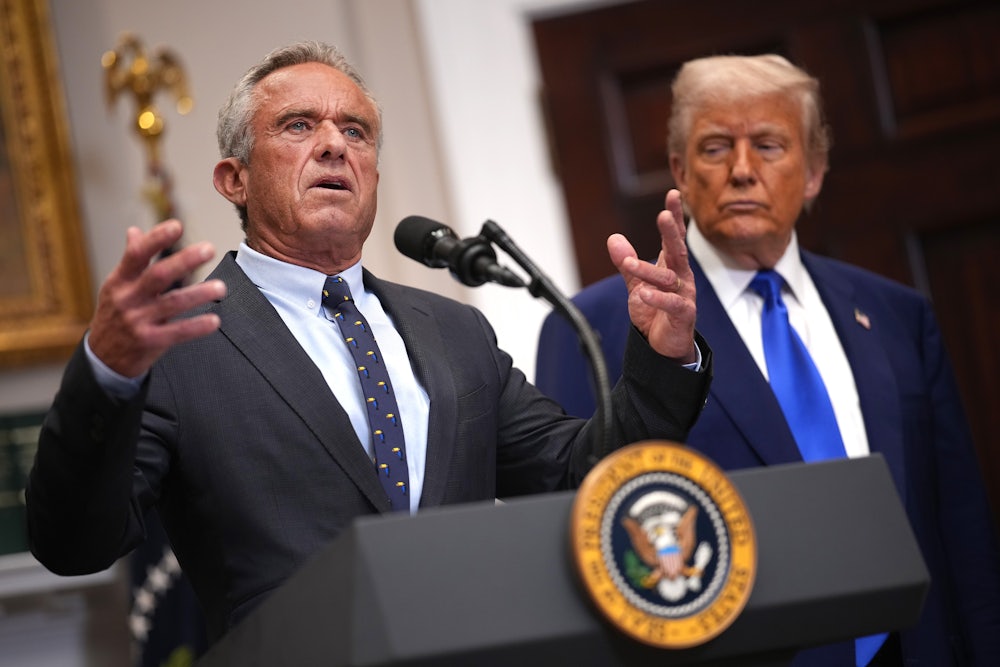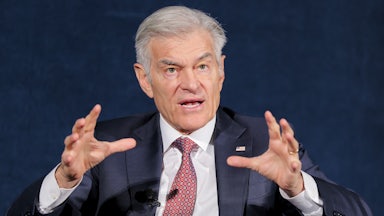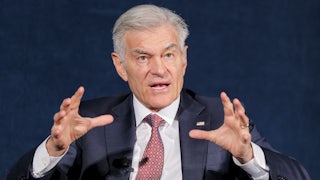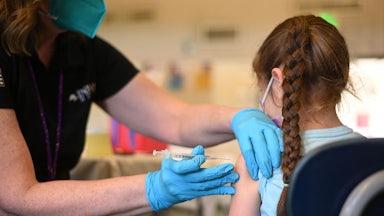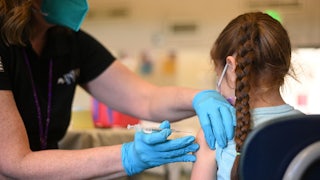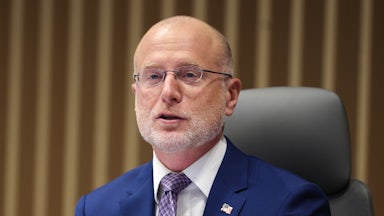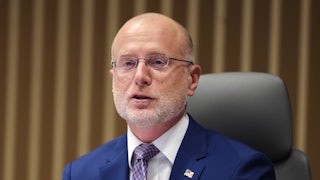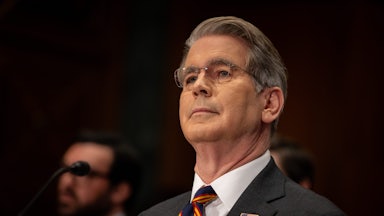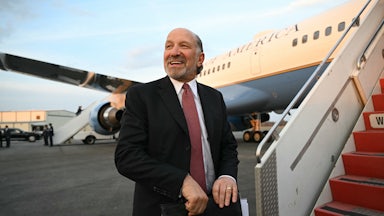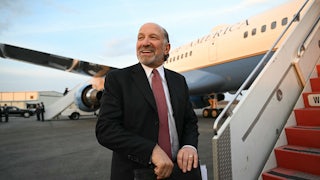The Trump administration has often claimed that it wants to increase the nation’s fertility rate. The Centers for Disease Control and Prevention reported last month that the rate is at roughly 1.6 births per woman. That is higher than in other major developed countries—South Korea has dropped to a fertility rate of 0.75, for example—but below the replacement level of 2.1.
Trump described himself as “the fertilization president” at a Women’s History Month event at the White House earlier this spring, a title he claims is apt because of his verbal support of in vitro fertilization, a practice that many other Republicans oppose on religious grounds. Robert F. Kennedy Jr., the secretary of health and human services, has expressed concern about the decline in potential fertility among younger Americans. “Our fertility is dropping dramatically,” he claimed in April. “Teenagers in this country have the same testosterone levels as 68-year-old men.” (He was presumably referring to teenage boys.)
JD Vance and other top Trump officials have supported the so-called “pronatalist” movement that advocates for much higher fertility rates, at least among certain groups of people. These concerns are shaping policy areas that might seem unrelated at first glance. Secretary of Transportation Sean Duffy ordered his department in February to prioritize infrastructure projects in “communities with marriage and birthrates higher than the national average.”
Most of the decline in the U.S. fertility rate can be attributed to the sharp decline in teenage pregnancies, something that would have been seen as a policy victory by conservatives a generation ago. Increasing fertility rates is a vexing issue that countries in Asia and Europe have struggled with for the last 20 years with little success.
Nonetheless, if the Trump administration is actually serious about the nation’s fertility rate, it might want to stop doing numerous things that will likely kill American children.
In April, for example, the Trump administration shuttered the communications office for the National Institute of Child Health and Human Development, one of the components of the National Institutes of Health, and laid off its workforce. Among the office’s responsibilities was coordinating the federal government’s participation in the Safe to Sleep program, which aims to encourage parents to adopt safe-sleep practices for newborns and infants.
The Safe to Sleep program emerged in the 1990s as researchers sought to identify the causes of sudden infant death syndrome, or SIDS, which killed thousands of infants every year at the time. While the specific causes of SIDS are still being studied, the program has helped persuade millions of parents to avoid practices that might seem safe or normal—bed-sharing, using blankets or stuffed animals, letting infants sleep at night in car seats and strollers—but actually contribute to suffocation risks. Those changes and others helped reduce SIDS deaths by 50 percent by the 2010s.
It is hard to imagine a better use of taxpayer funds than preventing infant deaths—or one more aligned with so-called “pronatalist” interests. Instead, the Trump administration appears poised to destroy how federal public health agencies track infant mortality and maternal health problems and communicate about them to Americans. Kennedy began his tenure at HHS by proposing a radical internal restructuring of the department, shuttering numerous programs, and directing layoffs for roughly 20,000 employees.
Among the casualties are the Pregnancy Risk Assessment Monitoring System, or PRAMS, which collects data on prenatal and postpartum care across the country to improve policymaking on maternal and infant health. The Washington Post reported that HHS also dismantled programs that collect fertility and reproductive health statistics, with vast downstream implications for research that relies on official numbers for issues ranging from IVF success rates to postpartum depression.
Personnel can be policy as well. Kennedy, the nation’s top public health official, has a long history of spreading doubt and confusion about childhood vaccinations for personal gain. After the island nation of Samoa paused its measles vaccination program in 2019 after a fatal vaccination mishap, Kennedy flew in to encourage government officials there to engage in a “natural experiment” to see what would happen if they went without vaccinating their children against the disease. The resulting measles epidemic killed at least 83 children and sickened thousands of others.
While seeking Senate confirmation earlier this year, Kennedy downplayed his anti-vaccine views and told senators that he would leave current childhood immunization schedules intact. That pledge appears to be hanging by a thread. Kennedy and his allies are reportedly planning to remove the Covid-19 vaccine from the schedule. They also plan to require that future vaccine studies include unvaccinated control groups, a practice that health experts had long opposed because it was unethical.
Some of Kennedy’s critics have described his policies and rhetoric, especially toward people with autism and vaccines, as “eugenic” in nature. After overseeing a measles outbreak in Texas that killed two children earlier this year, he recently suggested in a Fox News interview that the measles vaccine was unnecessary because the disease had a low mortality rate.
“Even in 1963, before the introduction of the vaccine, there were 400 deaths a year and there were up to two million measles cases,” he claimed. “Only very, very sick kids should die from measles.” With sufficient vaccination rates, however, it is possible to eliminate childhood deaths from measles altogether. Kennedy’s comments suggest that children who die from childhood measles outbreaks “should” die from it and that vaccinations only impede this outcome.
Other “Make America Healthy Again” advocates are cut from the same anti-scientific and conspiratorial cloth, casting themselves as brave truth-tellers who propose treatments that the medical establishment rejects as unproven and inflaming doubts about scientifically proven practices. At Kennedy’s behest, for example, Trump recently nominated Casey Means, a failed ENT surgeon with an inactive state medical license, to serve as the nation’s next surgeon general.
Means, like Kennedy, has espoused anti-vaccine views in the guise of questioning established truths and encouraging skepticism. That would make her a dangerous pick for an office that has long served as the nation’s “top doctor” of sorts. Among her other anti-child views is her promotion of “raw milk,” a term used by promoters to make unpasteurized milk sound natural and wholesome. Unpasteurized milk can sicken healthy adults by introducing them to a wide range of pathogens; those same illnesses can severely injure or kill children.
Means framed her advocacy of unpasteurized milk as one of personal empowerment. “When it comes to a question like raw milk, I want to be free to form a relationship with a local farmer, understand his integrity, look him in the eyes, pet his cow, and then decide if I feel safe to drink the milk from his farm,” she once claimed. For decades, Americans did not need to engage in such feel-good nonsense to obtain safe milk for themselves and their children because the Food and Drug Administration operated a national quality-control program for dairy producers. The Trump administration laid off that task force’s workers in April.
Beyond the nation’s public health apparatus, the Trump administration is also pushing federal agencies in ways that are directly harmful to children. Lee Zeldin, the administrator of the Environmental Protection Agency, has championed a radical plan to slash most of the agency’s regulatory efforts. In April, the agency moved to end grants for a variety of health-related programs, including one that studies pesticide exposure among children in rural America and another that traces how “forever chemicals” enter the nation’s food supply. Other deregulatory efforts for air and water pollution will likely have an indirect health impact on American children in the years and decades to come.
Last week, Trump also fired the three Democratic members of the Consumer Product Safety Commission, which is charged with organizing recalls of unsafe products. While its mandate covers products for Americans of all ages, the CPSC’s impact is most acutely felt in child-related products. The Trump administration eventually hopes to dismantle it altogether by absorbing it into Kennedy’s HHS. This campaign is hardly new: I wrote last year about efforts by the conservative legal establishment to defang the commission on behalf of companies that are frustrated by efforts to prevent them from selling unsafe products to American customers. But it is still striking given the agency’s cost-to-payoff ratio and uncontroversial nature.
Trump administration officials do not generally describe these moves as if their goal is to increase childhood mortality. (Kennedy appears to be an exception.) They typically justify them as part of an effort to alleviate regulatory burdens on businesses, to reduce government costs, or to otherwise shrink the federal workforce. The net effect of these policy changes, however, is to make this country a more dangerous place for Americans to give birth and grow up.
Is that at odds with Trumpworld’s embrace of pronatalism? Perhaps not. Taken at face value, the term pronatalism simply means to be in favor of births and children. (Antinatalism, a fringe movement that supports human extinction on philosophical grounds, is its counterpart.) I would venture to guess that being pronatalist in that sense describes the overwhelming majority of Americans, even those who do not have or do not plan to have kids of their own. My child-free friends were all happy for me when I had a kid recently, for example.
For American conservatives, pronatalism appears to mean something much different. DOGE head Elon Musk, a South African billionaire, has framed his concerns about “birth rates” along white nationalist lines by focusing on declining fertility rates in Europe and the United States. Vance has favored shaming women who don’t have children by deriding them as “childless cat ladies,” claiming they have no stake in the country’s future. Vance has also denounced federal subsidies for childcare that make it easier for working women to have children. Instead, he argued, children should be cared for at home by one of their parents. (Guess which parent he prefers.)
The Trump administration’s real goal is not to increase the fertility rate or, more specifically, to address policy issues that prevent Americans from having more children. Instead, it appears that they hope to reorient American society by driving women—and especially white women—out of the workforce and pressuring them to raise children at home. It is unlikely that the Trump administration can reverse a nearly century-long social and economic shift over the next four years. It is also unlikely that their efforts to do so will lead to any measurable boost to U.S. fertility rates. If the Trump administration’s goal is to increase childhood mortality rates over the next four years, on the other hand, then it is off to a terrific start.
